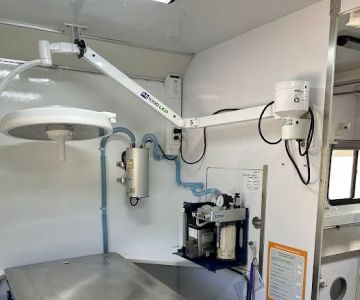Understanding Your Pet’s Weight Gain or Loss
As a pet owner, noticing a change in your pet's weight can be a cause for concern. Whether your furry friend is gaining or losing weight, it’s essential to understand the reasons behind these changes and what actions you should take. Just like us, pets can experience fluctuations in their weight for a variety of reasons, and identifying the cause can help ensure that they lead a long, healthy life.
In this article, we will dive into the common causes of weight gain or loss in pets, and offer advice on how to manage their weight for optimal health. Whether your pet has recently started packing on the pounds or shedding them unexpectedly, it's important to approach these changes with understanding and a plan of action.
1. Common Causes of Weight Gain in Pets
Weight gain in pets can be caused by several factors, including changes in diet, activity levels, and health conditions. Let’s look at some of the most common reasons your pet may be gaining weight.
- Overfeeding: One of the most common reasons for weight gain in pets is simply consuming more calories than they burn. If your pet is given too much food or too many treats, the excess calories can result in weight gain. It's important to measure their food and avoid overfeeding, especially with calorie-dense foods.
- Lack of Exercise: Pets who don't get enough physical activity are more prone to weight gain. If your pet is less active due to age, health issues, or simply not getting enough exercise, they may start putting on extra weight.
- Neutering/Spaying: After neutering or spaying, many pets experience a shift in metabolism, leading to an increased tendency to gain weight. This doesn't mean you should avoid neutering, but you should adjust their diet accordingly.
- Health Conditions: Some medical conditions can contribute to weight gain. Hypothyroidism, for example, is a common condition in dogs that leads to weight gain due to an underactive thyroid. Cushing's disease is another condition that can cause pets to gain weight. If you notice sudden or unexplained weight gain, it’s crucial to consult your vet for a proper diagnosis.
Understanding the cause of your pet's weight gain is the first step in helping them get back on track. If it’s due to overfeeding, simply adjusting their diet may be enough. However, if there’s an underlying health condition, you may need to work closely with your vet to manage it effectively.
2. Understanding Weight Loss in Pets
On the other hand, unexplained weight loss in pets can also be a serious concern. Whether it’s due to dietary issues or an underlying health problem, sudden weight loss should not be ignored.
- Illness or Infection: Illness is one of the most common causes of weight loss in pets. Conditions like cancer, gastrointestinal diseases, or kidney disease can lead to significant weight loss. If your pet is eating normally but still losing weight, a vet visit is essential to rule out these issues.
- Stress or Anxiety: Emotional stress or anxiety can lead to a loss of appetite, which may cause weight loss. For example, changes in the household, traveling, or a sudden change in routine can lead to stress-related weight loss.
- Dental Problems: If your pet is having trouble chewing due to dental issues, they may avoid eating, leading to weight loss. Regular dental checkups can help catch problems early.
- Old Age: Older pets may naturally lose weight due to a decrease in metabolism or a decrease in activity levels. However, significant weight loss should still be checked by a vet to ensure it’s not related to a medical condition.
If your pet is losing weight despite eating well, it’s crucial to consult with your veterinarian. Early diagnosis and treatment are key to preventing more severe issues from developing.
3. How to Monitor and Manage Your Pet’s Weight
As pet owners, it’s essential to actively monitor your pet’s weight. Here are some practical tips to help you keep your pet’s weight under control:
- Regular Weigh-Ins: Weigh your pet regularly to track any changes in their weight. If you notice any significant fluctuations, it's time to visit the vet to discuss possible causes.
- Portion Control: Stick to recommended serving sizes based on your pet’s age, size, and activity level. Avoid free-feeding, and instead, feed them measured portions at set times.
- Increase Exercise: Make sure your pet gets plenty of exercise. For dogs, this could mean daily walks, runs, or playtime. For cats, consider interactive toys that encourage movement and play.
- Healthy Diet: Choose high-quality pet food that is suitable for your pet’s age and size. Consult your vet for advice on the best food for your pet’s health needs.
Managing your pet’s weight involves a combination of proper diet, exercise, and regular monitoring. By staying proactive, you can help your pet maintain a healthy weight and avoid potential health issues.
4. The Role of the Veterinarian in Weight Management
As a pet parent, it’s important to involve your vet in your pet’s weight management plan. If you're unsure about the cause of your pet’s weight gain or loss, a vet is the best person to consult. They can conduct tests to diagnose underlying health conditions and provide tailored advice on diet, exercise, and lifestyle adjustments.
In some cases, your vet may recommend specific weight loss or weight gain plans, including prescription diets or medications to manage conditions like hypothyroidism. Your vet can also help you set realistic weight goals for your pet and provide ongoing support to keep them on track.
5. Real-Life Story: Helping My Dog Lose Weight
When my dog Max started gaining weight, I was initially unsure what to do. He was eating the same amount of food, but he wasn’t as active as before. After a visit to the vet, we discovered that Max had developed arthritis, making it difficult for him to move around as much. The vet recommended a low-calorie diet and a more tailored exercise routine, which included short, gentle walks. Over the next few months, Max lost the extra weight, and his mobility improved.
This experience taught me the importance of working with a vet to address both the symptoms and the underlying issues contributing to weight gain. It also reinforced the need for regular checkups to catch potential problems early.
6. Conclusion: Keep Your Pet Healthy and Happy
Managing your pet’s weight is essential for their overall health and happiness. Whether they’re gaining or losing weight, it’s important to stay vigilant and consult your vet if you notice any changes. With the right diet, exercise, and professional guidance, you can help your pet achieve and maintain a healthy weight.
Remember, a healthy weight not only extends your pet’s life but also improves their quality of life. Start today by implementing the tips discussed in this article, and ensure your furry friend lives their healthiest, happiest life.
SEO Title: Understanding Your Pet’s Weight Gain or Loss SEO Keywords: pet weight gain, pet weight loss, managing pet weight, pet health, understanding pet weight changes, weight loss in pets SEO Description: Discover how to manage your pet's weight gain or loss with expert advice. Learn about the causes, symptoms, and how to maintain a healthy weight for your pet.










